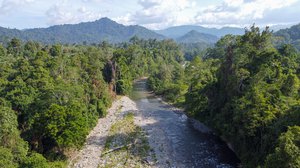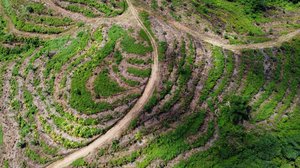The rainforests which blanket the island nation of Papua New Guinea (PNG) are among the world’s remaining natural wonders. One of earth’s largest tropical rainforests, they support astounding biodiversity, including endemic creatures like forest dragons, tree kangaroos, birds of paradise, and the only known night-blooming orchid. Indigenous and forest communities are the guardians of these precious ecosystems, with deep expertise in how to live sustainably alongside these thriving biomes. Customary land and forests are also a major economic force in rural PNG – providing communities with vital sources of local food, medicines, housing materials and culture.

Natural rainforest in the Bainings region of East New Britain, Papua New Guinea
But the same profit-making forces that are driving the global climate crisis, extracting minerals, burning fossil fuels, and felling trees are creating an environmental and human rights disaster in these ancient forests. That disaster poses an existential threat to the communities that call them home and to us all, given PNG is home to one of the world’s climate-critical forests.
At the heart of the problem is a product that you’ve likely already consumed today. Palm oil is a ubiquitous yet invisible component in the global economy – today it is in around 50% of products consumers purchase and use on a daily basis, from chocolate and cakes to shampoo and cosmetics. The industrialisation of palm oil over recent decades has driven a spate of social and environmental catastrophes – its business model implicitly relying on cheap land and cheap labour. It builds on a long legacy of troubling plantation agriculture in tropical regions.
In Papua New Guinea, investors and agribusiness magnates are today betting on a goldrush. By 2030, the government of PNG aims to have 1.5m hectares under oil palm cultivation, compared to about 150,000 ha in 2016 – a ten-fold increase. This is all to be grown on the customary land of local communities. Companies that spent decades tearing down forests in neighbouring Malaysia have jumped in. Global Witness has spent two years investigating three companies that began exporting palm oil from PNG since 2014: the East New Britain Resources Group (“ENB”), the Rimbunan Hijau Group (“RH”), and Bewani Oil Palm Plantations Ltd (“Bewani”).

Land cleared for Oil Palm plantations in the Bainings region of East New Britain, Papua New Guinea.
The findings are grim. In their drive to fell tens of thousands of hectares of rainforest to produce palm oil for export, these companies variably engaged in the use of child labour, tax evasion, and bribery of government officials. In one shocking incident, the village of Watwat was subject to a raid by armed officers, intent on retribution for the vandalization of nearby palm trees. Men and boys as young as 16 were dragged from their beds, beaten with metal bars, and thrust down into the mud at gunpoint. They were blindfolded and arrested, then held for weeks, only to be released on payment of a crippling bail. This raid was ordered by the palm oil company in an attempt to quell any protests. We contacted the companies involved for comment, and our full report details the responses we received, including denials of some of our findings.
The allegations in our investigation, substantiated in part by on-tape admissions from senior executives during meetings with undercover Global Witness investigators, are horrific – but will come as no surprise to civil society groups who have been tracking this problematic industry worldwide for decades. Unethical companies are known to bend and break rules. Yet our investigation reveals something more shocking still – that the operations of ENB, RH and Bewani were made possible by a web of global financiers and household brands.
The list is illustrious and reeks of hypocrisy. BlackRock, the world’s largest asset manager, whose CEO Larry Fink wrote last year that climate change will be “a defining factor in companies’ long-term prospects,” and that “we are on the edge of a fundamental reshaping of finance”. Reckitt, COP26 sponsor and official partner of the UK government in its role as global climate negotiation broker. Cargill, the global commodity trader which professes its goal to produce deforestation-free palm oil. The list goes on and on – rich, powerful companies which have loudly extolled their sustainable sourcing and investment policies, all of which are connected to one or more of these three companies in PNG.
Take BlackRock. Large-scale industrial agriculture is a capital-intensive industry, and ready access to capital is thus a pinch-point on the ambitions of destructive corporations such as ENB. Without financing, the companies would find tearing down trees much more difficult. Yet Global Witness has discovered that the infamous Malaysian financial powerhouse Malayan Banking Berhad (Maybank) has chosen to bankroll ENB’s activities. Despite its voluntary policies and preachy letters from the CEO, BlackRock is a shareholder of Maybank, enabling and potentially profiting from ENB’s activities. Clearly, we have not quite arrived at the foretold reshaping of finance promised by Mr Fink. BlackRock and Maybank (as well as other financiers and companies we approached) also responded to our findings.
Many people in Papua New Guinea have taken considerable personal risks in telling their stories and sharing information about what is happening. This is just one more example of the incredible efforts that local people have taken to try to protect the rights of their communities and forests.
None of the consumer companies or financial institutions we name in our investigation have yet – to our knowledge – afforded affected communities in Papua New Guinea the basic human dignity of trying to meet with them to understand what has gone wrong and how they can be accountable for their role in the problem in a way that is meaningful for people on the ground.
This has to change. Our horrifying findings, and the involvement of global giants like BlackRock in this trail of destruction is point towards the solution. Self-regulation for profit-making financial institutions, the system that we currently have, has been proven not to work – it’s the approach that gave us the climate crisis. Governments in jurisdictions where these big investors are based, including the UK, US, and EU, could introduce legislation requiring businesses, including banks and investors, to identify and prevent deforestation and related human rights abuses in their supply chains and financing. That would have a big impact on firms’ ability to continue profiting from deforestation.
COP26 is just around the corner, and world and business leaders will soon gather in Glasgow to offer their latest solutions and hot takes on how we get to meaningful climate action by 2030 or 2050. The truth is, the climate crisis is upon us, and if we are to have a chance, all remaining forests need to stay standing. We know what needs to be done, and governments have the tools at their disposal to legislate and end the complicity of global brands and finance in deforestation and human rights abuses.

